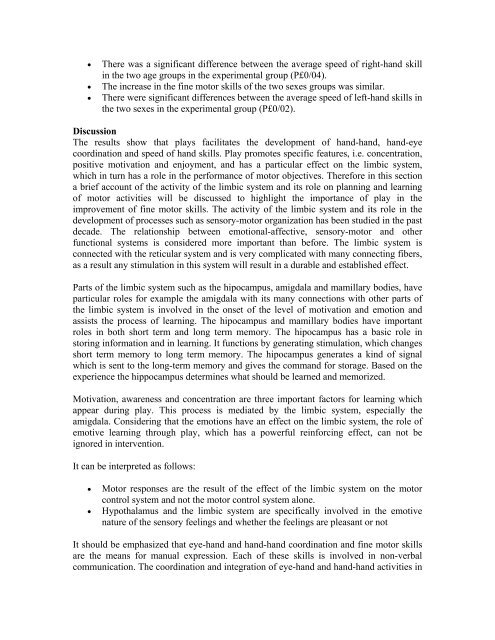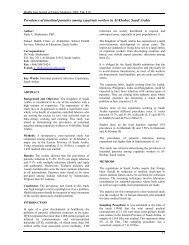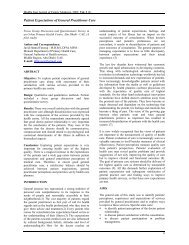THE IMPACT OF EDUCATIONAL PLAY ON FINE MOTOR SKILLS ...
THE IMPACT OF EDUCATIONAL PLAY ON FINE MOTOR SKILLS ...
THE IMPACT OF EDUCATIONAL PLAY ON FINE MOTOR SKILLS ...
You also want an ePaper? Increase the reach of your titles
YUMPU automatically turns print PDFs into web optimized ePapers that Google loves.
• There was a significant difference between the average speed of right-hand skillin the two age groups in the experimental group (P£0/04).• The increase in the fine motor skills of the two sexes groups was similar.• There were significant differences between the average speed of left-hand skills inthe two sexes in the experimental group (P£0/02).DiscussionThe results show that plays facilitates the development of hand-hand, hand-eyecoordination and speed of hand skills. Play promotes specific features, i.e. concentration,positive motivation and enjoyment, and has a particular effect on the limbic system,which in turn has a role in the performance of motor objectives. Therefore in this sectiona brief account of the activity of the limbic system and its role on planning and learningof motor activities will be discussed to highlight the importance of play in theimprovement of fine motor skills. The activity of the limbic system and its role in thedevelopment of processes such as sensory-motor organization has been studied in the pastdecade. The relationship between emotional-affective, sensory-motor and otherfunctional systems is considered more important than before. The limbic system isconnected with the reticular system and is very complicated with many connecting fibers,as a result any stimulation in this system will result in a durable and established effect.Parts of the limbic system such as the hipocampus, amigdala and mamillary bodies, haveparticular roles for example the amigdala with its many connections with other parts ofthe limbic system is involved in the onset of the level of motivation and emotion andassists the process of learning. The hipocampus and mamillary bodies have importantroles in both short term and long term memory. The hipocampus has a basic role instoring information and in learning. It functions by generating stimulation, which changesshort term memory to long term memory. The hipocampus generates a kind of signalwhich is sent to the long-term memory and gives the command for storage. Based on theexperience the hippocampus determines what should be learned and memorized.Motivation, awareness and concentration are three important factors for learning whichappear during play. This process is mediated by the limbic system, especially theamigdala. Considering that the emotions have an effect on the limbic system, the role ofemotive learning through play, which has a powerful reinforcing effect, can not beignored in intervention.It can be interpreted as follows:• Motor responses are the result of the effect of the limbic system on the motorcontrol system and not the motor control system alone.• Hypothalamus and the limbic system are specifically involved in the emotivenature of the sensory feelings and whether the feelings are pleasant or notIt should be emphasized that eye-hand and hand-hand coordination and fine motor skillsare the means for manual expression. Each of these skills is involved in non-verbalcommunication. The coordination and integration of eye-hand and hand-hand activities in
















